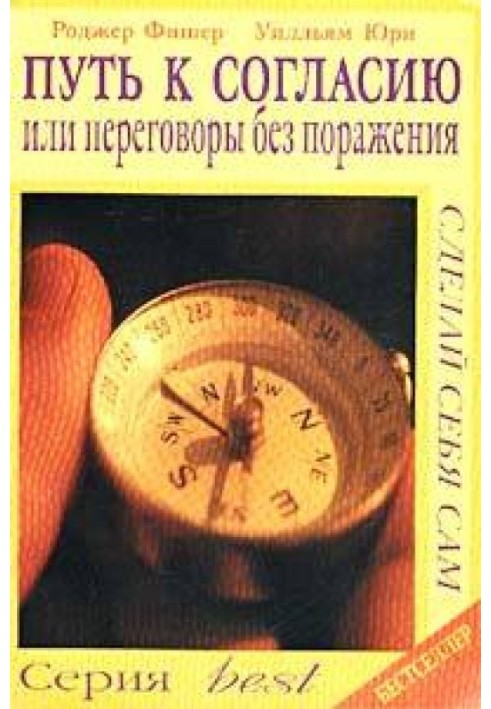The path to agreement or negotiations without defeat
 Instant download
Instant download
after payment (24/7)
 Wide range of formats
Wide range of formats
(for all gadgets)
 Full book
Full book
(including for Apple and Android)
This book began with a question: How can people best deal with their differences? For example, what is the best advice to give to a divorcing husband and wife who want to know how to reach a fair and satisfactory agreement without the usual violent quarrel? Or - what is even more difficult - what advice can be given to one of them, guided by the same considerations? Every day, families, neighbors, spouses, employees, bosses, businessmen), consumers, sellers, lawyers and countries find themselves faced with the same dilemma - how to say “yes” to each other without resorting to war with each other. Drawing on our knowledge of international law and anthropology, and drawing on extensive long-term collaboration with practitioners, colleagues and students, we have developed a practical method reaching agreements on a friendly basis, without defeating the parties. We tested our ideas in conversations with lawyers, businessmen, government officials, judges, prison governors, diplomats, insurance representatives, miners and oil company executives. We express our gratitude to all those who critically responded to our work and shared their comments and suggestions with us. We have benefited greatly from this. Frankly, so many people have contributed to our research over the years that it is now completely impossible to say exactly who we are most indebted to for which ideas. Those who have contributed the most will, of course, understand that we have not made references not because we believed that every idea was first expressed by us, but rather in order for the text to be readable at all, especially, we repeat, we owe it to a very large number of people. And yet we cannot help but say about Howard Raiff. His kind but frank criticism repeatedly improved our approach. Moreover, his comments on the need to seek mutual benefits in negotiations by exploiting existing differences, as well as the role of imagination in solving difficult problems, inspired us to write separate sections of the book devoted to these issues. Louis Sohn, an extraordinary visionary and negotiator, constantly inspired us with his constant ingenuity and vision for the future. Among other things, we owe him the fact that he introduced us to the idea of using a single negotiating text, which we called "The procedure of one text." We would also like to thank Michael Doyle and David Strauss for their creative brainstorming. It was very difficult to find relevant stories and examples. Here we are indebted to Jim Sibenius for his reviews of the Law of the Sea Conference (as well as for his thoughtful criticism of our method), Tom Griffith for his account of his negotiations with an insurance company clerk, and Mary Parker Follett for the story of two men arguing in a library. We would especially like to thank all those who have read this book in various manuscript versions and have allowed us to benefit from their criticisms, including our student participants in the Negotiation Workshops held in January 1980 and 1981. at Harvard Law School, and also Frank Sander, John Cooper and William Lincoln, who led these groups with us. We would like to thank in particular those members of the Harvard Negotiation Seminar whom we have not yet mentioned; they have listened patiently to us over the past two years and made many useful suggestions - John Dunlop, James Healy, David Küchl, Thomas Schelling and Lawrence Susskind. To all our friends and allies we owe more than we can express, but the authors bear final responsibility for the contents of the book; if the result is imperfect, it is not due to lack of effort on the part of our colleagues. Without the help of family and friends, writing would be unbearable. For constructive criticism and moral support, we thank Carolyn Fisher, David Lax, Francis Turnbull, and Janice Urey. Without Francis Fisher this book would never have been written. It was he who introduced us to each other about four years ago. Without excellent secretarial assistance, nothing would have worked out for us either. Thanks to Deborah Reimel for her unfailing competence, moral support, and firm but kind reminders, and to Denise Trybula, whose diligence and cheerfulness never wavered. Special thanks to the staff at Word Processing, led by Cynthia Smith, who stood the test of endless options and almost impossible deadlines. Then there are our editors. By rearranging and cutting our book in half, Marty Lynskey has made it much more readable. To spare our readers, he had the good sense not to spare our feelings. Thanks also to Peter Kinder, Jun Kinoshita and Bob Rossa. June tried to keep as little unparliamentary language as possible in the book. Where this has failed, we apologize to those who may be offended by this. We would also like to thank Andrea Williams, our advisor: Juliana Bach, our agent; Dick McAdow and his colleagues at Houghton Mifflin, who made the publication of this book both possible and enjoyable. Finally, we want to thank Bruce Patton, our friend and colleague, editor and facilitator. No one did more for this book than he. From the very beginning, he helped brainstorm and organized the book's syllogisms. He rearranged almost every chapter and edited every sentence. If books were movies, ours would be known as a "Patton production."
Data sheet
- Name of the Author
- Роджер Фишер
Уильям Юри - Language
- Russian















